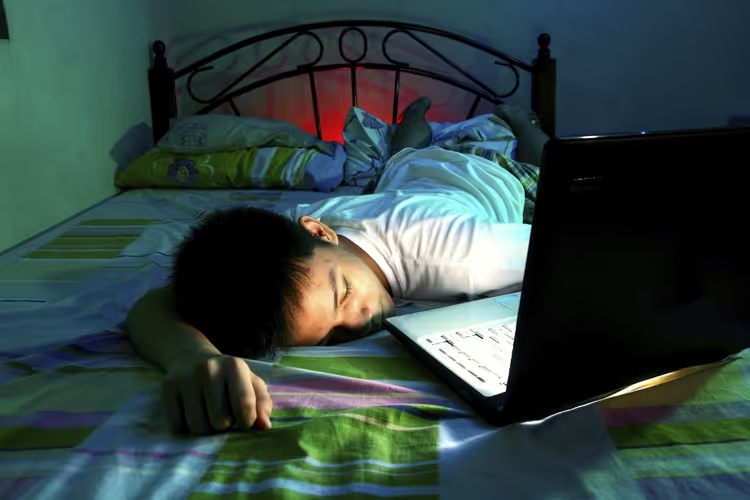


Teens who don't get enough sleep (less than 7 hours) are at risk for engaging in risky behaviors including driving with someone drunk and drinking and driving, according to a recently released CDC survey. Here's what they found:
"Insufficient sleep is common among high school students and is associated with an increased risk for unintentional injury from drowsy driving crashes and other causes.
Students who reported sleeping ≤7 hours on school nights were more likely to report several injury-related risk behaviors (infrequent bicycle helmet use, infrequent seatbelt use, riding with a driver who had been drinking, drinking and driving, and texting while driving) compared with students who sleep 9 hours."
The National Sleep Foundation recommends teens 14–17 years should get 8–10 hours of sleep per night.
Wheaton AG, Olsen EO, Miller GF, Croft JB. Sleep Duration and Injury-Related Risk Behaviors Among High School Students — United States, 2007–2013. MMWR Morb Mortal Wkly Rep 2016;65:337–341. DOI: http://dx.doi.org/10.15585/mmwr.mm6513a1
Learn more about showing our movies in your school or community!
Join Screenagers filmmaker Delaney Ruston MD for our latest Podcast

Learn more about our Screen-Free Sleep campaign at the website!
Our movie made for parents and educators of younger kids
Learn more about showing our movies in your school or community!
Learn more about showing our movies in your school or community!
Join Screenagers filmmaker Delaney Ruston MD for our latest Podcast

Learn more about our Screen-Free Sleep campaign at the website!
Our movie made for parents and educators of younger kids
Join Screenagers filmmaker Delaney Ruston MD for our latest Podcast
As we’re about to celebrate 10 years of Screenagers, we want to hear what’s been most helpful and what you’d like to see next.
Please click here to share your thoughts with us in our community survey. It only takes 5–10 minutes, and everyone who completes it will be entered to win one of five $50 Amazon vouchers.
Teens who don't get enough sleep (less than 7 hours) are at risk for engaging in risky behaviors including driving with someone drunk and drinking and driving, according to a recently released CDC survey. Here's what they found:
"Insufficient sleep is common among high school students and is associated with an increased risk for unintentional injury from drowsy driving crashes and other causes.
Students who reported sleeping ≤7 hours on school nights were more likely to report several injury-related risk behaviors (infrequent bicycle helmet use, infrequent seatbelt use, riding with a driver who had been drinking, drinking and driving, and texting while driving) compared with students who sleep 9 hours."
The National Sleep Foundation recommends teens 14–17 years should get 8–10 hours of sleep per night.
Wheaton AG, Olsen EO, Miller GF, Croft JB. Sleep Duration and Injury-Related Risk Behaviors Among High School Students — United States, 2007–2013. MMWR Morb Mortal Wkly Rep 2016;65:337–341. DOI: http://dx.doi.org/10.15585/mmwr.mm6513a1
Sign up here to receive the weekly Tech Talk Tuesdays newsletter from Screenagers filmmaker Delaney Ruston MD.
We respect your privacy.
Teens who don't get enough sleep (less than 7 hours) are at risk for engaging in risky behaviors including driving with someone drunk and drinking and driving, according to a recently released CDC survey. Here's what they found:
"Insufficient sleep is common among high school students and is associated with an increased risk for unintentional injury from drowsy driving crashes and other causes.
Students who reported sleeping ≤7 hours on school nights were more likely to report several injury-related risk behaviors (infrequent bicycle helmet use, infrequent seatbelt use, riding with a driver who had been drinking, drinking and driving, and texting while driving) compared with students who sleep 9 hours."
The National Sleep Foundation recommends teens 14–17 years should get 8–10 hours of sleep per night.
Wheaton AG, Olsen EO, Miller GF, Croft JB. Sleep Duration and Injury-Related Risk Behaviors Among High School Students — United States, 2007–2013. MMWR Morb Mortal Wkly Rep 2016;65:337–341. DOI: http://dx.doi.org/10.15585/mmwr.mm6513a1


Catherine Price’s “Rebel's Code” focuses on intentional technology use and prioritizing real-world friendship, freedom, and fun. Her book The Amazing Generation, co-written with Jonathan Haidt, introduces these concepts to children through interactive formats and teen perspectives. Research indicates that when adolescents understand how platforms are designed to exploit attention, they show greater motivation to limit their social media use.
READ MORE >
Many adults keep their phones by the bed — it feels harmless, even necessary. But what if that habit is quietly affecting our sleep and the example we set for our kids? In this week’s blog, Dr. Ruston shares two key things every parent should know about sleeping next to a phone, and how small nighttime tech changes can make a big difference for the whole family.
READ MORE >for more like this, DR. DELANEY RUSTON'S NEW BOOK, PARENTING IN THE SCREEN AGE, IS THE DEFINITIVE GUIDE FOR TODAY’S PARENTS. WITH INSIGHTS ON SCREEN TIME FROM RESEARCHERS, INPUT FROM KIDS & TEENS, THIS BOOK IS PACKED WITH SOLUTIONS FOR HOW TO START AND SUSTAIN PRODUCTIVE FAMILY TALKS ABOUT TECHNOLOGY AND IT’S IMPACT ON OUR MENTAL WELLBEING.
